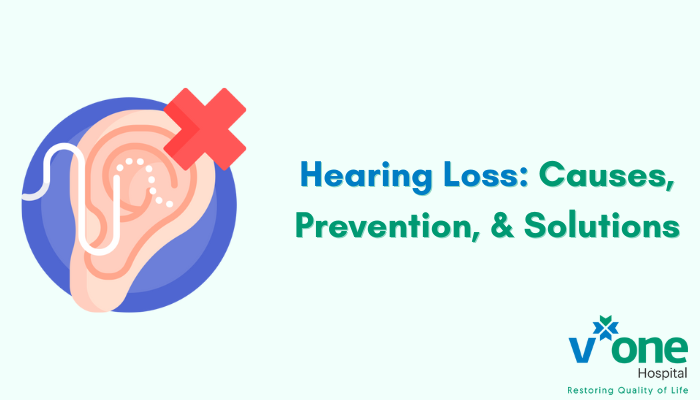Hearing Loss Explained: Causes, Prevention, and Solutions
Hearing loss, a complex and often underestimated condition, can significantly impact our daily lives. In this detailed exploration, we aim to demystify hearing loss, covering its various dimensions, causes, prevention tips, and cutting-edge solutions.
Understanding the Complexities of Hearing Loss
The Intricacies of Hearing
Hearing involves an intricate process—from the ear canal to the inner ear, where sound waves transform into electrical signals for the brain. Any disruption in this process can result in hearing issues.
Degrees of Hearing Loss
Hearing loss is categorized by degrees, ranging from mild to profound. Understanding these degrees helps in gauging the impact on daily communication.
Unraveling the Causes of Hearing Loss
1. Age-Related Hearing Loss (Presbycusis)
As we age, the natural wear and tear on the inner ear’s hair cells contribute to gradual hearing loss.
2. Noise-Induced Hearing Loss
Prolonged exposure to loud noises, whether in the workplace or during recreational activities, can damage the delicate structures of the inner ear.
3. Genetics and Hearing Loss
A family history of hearing issues can increase the likelihood of experiencing hearing loss.
4. Ear Infections and Hearing Impairment
Infections affecting the ear canal or middle ear can lead to temporary or permanent hearing loss.
5. Traumatic Injuries and Sudden Hearing Loss
Head injuries or exposure to sudden, intense noises can cause immediate and sometimes irreversible hearing loss.
6. Medications and Ototoxicity
Certain medications, known as ototoxic drugs, can harm the ear structures and result in hearing impairment.
Recognizing the Telltale Signs of Hearing Loss
1. Difficulty Understanding Spoken Words
Struggling to follow conversations, particularly in noisy environments, is a common indicator.
2. Social Withdrawal due to Hearing Issues
Difficulty hearing and understanding can lead to social isolation as individuals may avoid situations where communication is challenging.
3. Increasing Volume
A need to turn up the volume on electronic devices, often to levels uncomfortable for others.
4. Misinterpreting Spoken Words
Difficulty understanding specific words, leading to frequent misunderstandings.
5. Ringing in the Ears (Tinnitus)
Tinnitus is a persistent ringing or buzzing sound in the ears, often accompanying hearing loss.
Preventive Measures for Hearing Health
1. Protect Your Ears
Consistent use of ear protection in noisy environments and limiting exposure to loud sounds are crucial preventive measures.
2. Regular Hearing Check-ups
Routine hearing assessments, ideally conducted by a qualified audiologist, aid in the early detection of hearing issues.
3. Healthy Lifestyle Choices
Managing underlying health conditions, such as diabetes and cardiovascular issues, contributes to overall hearing health.
4. Ear Hygiene Practices
Gentle ear cleaning and refraining from using sharp objects to clean the ears help prevent infections.
5. Stay Physically Active
Regular physical activity improves blood flow to the ears, promoting overall ear health.
6. Monitor Medications
Be aware of medications that may have ototoxic effects. Consult with healthcare providers about potential hearing-related side effects.
Revolutionary Solutions for Hearing Loss
1. Hearing Aids
Modern hearing aids are sophisticated devices that amplify sounds selectively, offering a tailored solution to individual hearing needs.
2. Cochlear Implants
For severe hearing loss, cochlear implants are surgically implanted devices that directly stimulate the auditory nerve, bypassing damaged portions of the ear.
3. Assistive Listening Devices
Technological advancements have led to devices like FM systems and captioned telephones, designed to enhance hearing in specific situations.
4. Bone-Anchored Hearing Systems
Implantable devices that conduct sound through the bone to the inner ear, are suitable for specific types of hearing loss.
Choosing the Right Path: Seeking Professional Help
1. ENT Specialists
Consulting Ear, Nose, and Throat (ENT) specialists in Indore is crucial for a comprehensive evaluation of hearing issues, especially when medical intervention is required.
2. Audiologists
Audiologists specialize in assessing and managing hearing disorders, offering personalized solutions and rehabilitation.
3. Support Groups for Emotional Well-being
Engaging with support groups can provide emotional support and practical insights into coping with the challenges of hearing loss.
Frequently Asked Questions (FAQs)
Q1: Can hearing loss be prevented?
Yes, adopting preventive measures such as ear protection in noisy environments, regular check-ups, and healthy lifestyle choices can significantly reduce the risk.
Q2: Are there natural remedies for hearing loss?
While some lifestyle changes may support overall ear health, professional intervention and technological solutions are typically required for significant hearing loss.
Q3: How often should one have a hearing check-up?
It is recommended to have a baseline hearing test in adulthood and regular check-ups thereafter, especially if you notice any changes in your hearing.
Q4: Can hearing aids restore normal hearing?
Hearing aids can significantly improve hearing by amplifying sounds, but they may not fully restore normal hearing.
Q5: Are there financial assistance programs for hearing aids?
Some programs and insurance plans may provide financial assistance or coverage for hearing aids. It’s essential to explore available options.
In the symphony of life, our ability to hear orchestrates our connection to the world. By unraveling the layers of hearing loss, understanding its roots, and embracing preventive measures and solutions, we reclaim not just our auditory sense but our vibrant engagement with life.
Let this knowledge be a compass guiding us toward a future where the richness of sound accompanies us on every step of our journey. May the echoes of empowered hearing resonate in our lives and the lives of those we touch.

